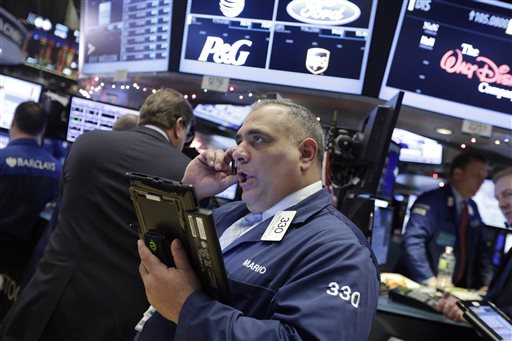
Trader Mario Innella works on the floor of the New York Stock Exchange, Monday, Jan. 4, 2016. U.S. stocks are opening 2016 on a grim note, dropping sharply after a plunge in China and declines in Europe. AP Photo
SEOUL, South Korea— Most Asian stock markets inched higher Tuesday as China’s benchmark stabilized a day after plunging nearly 7 percent.
The Shanghai Composite Index wavered between gains and losses. It was last up 0.1 percent at 3,299.99. Japan’s Nikkei 225 added 0.3 percent to 18,514.33 while Australia’s S&P/ASX 200 slipped 0.9 percent to 5,224.40.
South Korea’s Kospi was up 0.7 percent to 1,932.45 and Hong Kong’s Hang Seng gained 0.2 percent to 21,371.44. Stocks in Southeast Asia were mixed.
Global stocks started the new year on a grim note as poor manufacturing reports from China and the U.S. triggered fears about waning growth around the world. The steep fall on Monday prompted Chinese authorities to halt trading by using a new “circuit-breaker” mechanism for the first time.
READ: Stocks sink around the world on first trading day of 2016
“Traders are not seeing clarity on the direction of growth. As we are all too familiar with, uncertainty is quite bad for the financial markets,” said Bernard Aw, market strategist at IG in Singapore.
Tensions in the Middle East also unnerved investors. Saudi Arabia severed diplomatic relations over the weekend in a dispute over the Saudis’ execution of a Shiite cleric. Concerns about a potential threat to world oil supply pushed up prices of oil.
Wall Street finished lower on Monday. The Dow Jones industrial average dropped 1.6 percent lower to 17,148.94. The Standard & Poor’s 500 lost 1.5 percent to 2,012.66. The Nasdaq composite fell 2.1 percent to 4,903.09.
Benchmark U.S. crude added 28 cents to $37.04 per barrel on the New York Mercantile Exchange. The contract fell 28 cents to close at $36.76 a barrel on Monday. Brent Crude, the international standard, added 26 cents to $37.48 per barrel in London.
In currencies, the dollar rose to 119.54 yen from 119.43 yen in the previous trading session. The euro rose slightly to $1.0828 from $1.0826.
RELATED VIDEOS


